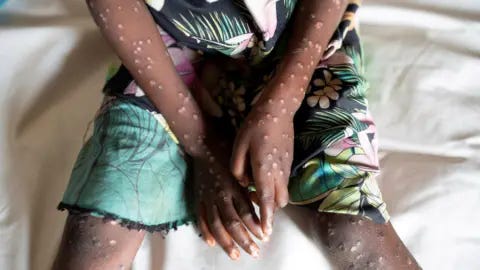Is the new pandemic here?
⚠️ SOS
Hey everyone. It’s Friday—though it hardly feels like a reason to celebrate. If this week has felt like a long, unending stretch, we’ve got something that deserves your attention. We’ve uncovered some critical news that might be the most important thing you’ll hear as the week comes to a close.
But before we dive into that, let’s shake off those Friday feels with a fun task:
📌 Plan a mini weekend getaway or a fun activity you can look forward to. It could be a picnic, a movie marathon, or a visit to a nearby attraction.
Now, let’s get started…
⚠️ Mpox Alert
On Wednesday, the World Health Organization (WHO) declared mpox a Public Health Emergency of International Concern (PHEIC) for the second time in two years. This decision comes in response to a recent spike in cases, particularly in the Democratic Republic of Congo (DRC) and its neighboring countries. Since 2022, there have been at least 99,176 mpox cases and 208 deaths reported across 116 countries.
But, what is Mpox?
The virus that causes mpox, also known as monkeypox, is a part of the Orthopoxvirus genus, which also contains the smallpox virus. It can infect both humans and animals. Fever, enlarged lymph nodes, and a rash with blisters are among the symptoms. It usually lasts two to four weeks and is moderate and self-limiting, but in children, pregnant women, and those with compromised immune systems, it can become severe.
Direct contact with contaminated skin or bodily fluids, including sexual contact, is the means of transmission. Animal bites, scratches, and handling contaminated meat can potentially spread the disease. Lesion sample PCR testing confirms the diagnosis.
And, why is the outbreak so concerning?
The outbreak, driven by a more dangerous strain, clade Ib, is spreading rapidly. Principal causes for worry include:
New and Severe Strain: A new and severe strain known as Clade Ib is spreading swiftly and is producing more severe disease than the previously prevalent Clade II. Clade Ib is more virulent than the former. Its ability to transmit from person to person raises the possibility of extensive epidemics.
Increased Spread: The outbreak has spread from the Democratic Republic of the Congo to several other African nations, and even Sweden recently reported the first case of clade Ib outside of Africa. The chance of a global spread is increased by this wider geographic reach.
Limited Surveillance and Diagnostics: It is difficult to identify and successfully contain the epidemic in rural regions where mpox is common because of insufficient surveillance. The disease's impact may be underestimated as a result of this restricted diagnostic capability.
Public Health Burden: Mpox can be lethal and causes great misery, especially to babies and people with compromised immune systems. The impact on public health is increasing due to the continued spread.
Response and Vaccination Challenges: Vaccines are available, however not all afflicted locations have easy access to them. In order to contain the outbreak, the WHO and its allies are trying to enhance vaccination accessibility and bolster surveillance.
So, that’s it for today. Let’s meet again tomorrow 👋 Till then, stay curious, and stay safe.



